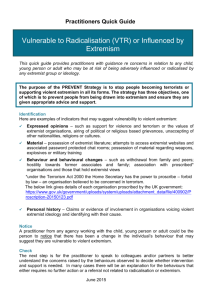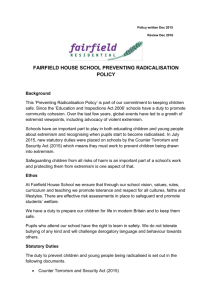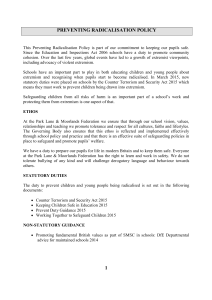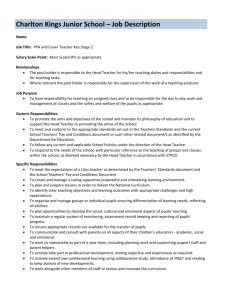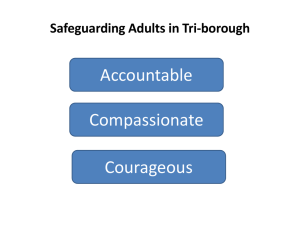Amending Safeguarding Policies and Practice to Include Prevent
advertisement
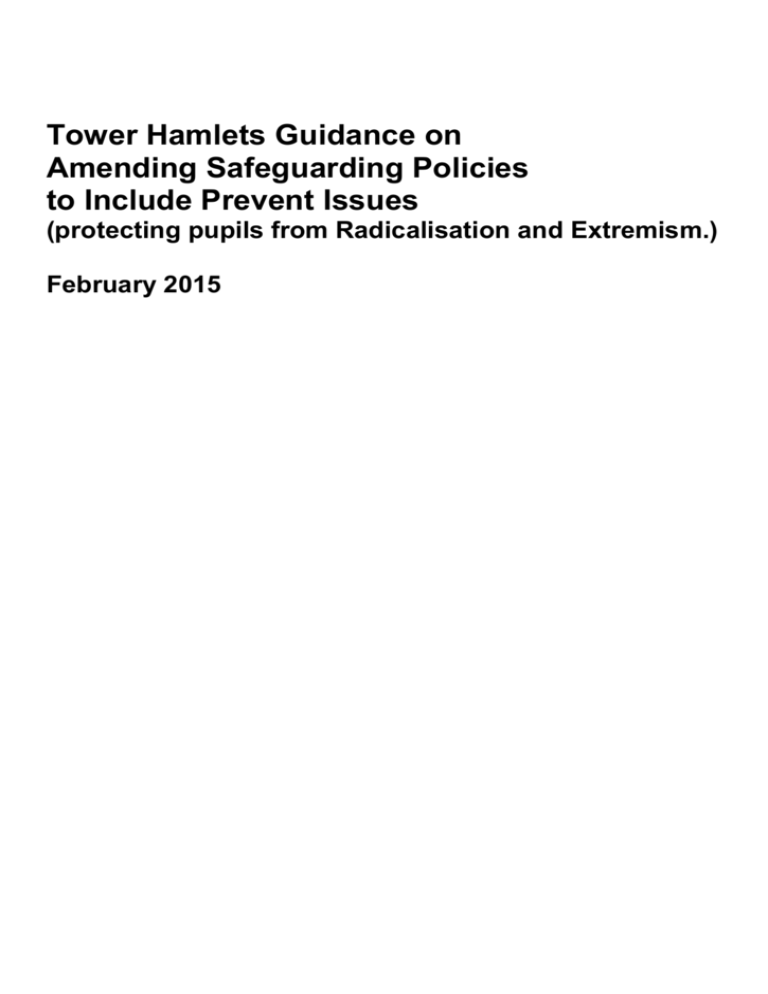
Tower Hamlets Guidance on Amending Safeguarding Policies to Include Prevent Issues (protecting pupils from Radicalisation and Extremism.) February 2015 Amending Safeguarding Policies and Practice to Include Prevent Issues Further DfE / Ofsted Guidance is expected but the following may assist in the interim. An updated Ofsted inspection frameworkpublished in January 2013 sets out expectations on preventing extremism. It directs inspectors to examine a school’s response to extremist behaviour when considering the behaviour and safety of pupils, as well as the effectiveness of the leadership and management of the school in preventing extremism. The Government has said that it intends to strengthen these provisions in the near future. Since 2012, it has been required by law for teachers “not to undermine fundamental British values, including democracy, the rule of law, individual liberty and mutual respect, and tolerance of those with different faiths and beliefs.” In light of recent events you will wish to consider the following questions; • Do you need to update your existing safeguarding and child protection policies to reflect the potential risk of pupils becoming radicalised or engaging in extremism? • Do key staff know how to identify when a pupil may be at risk of engaging in extremism and how to respond if they do? • Is there potential for pupils to be inadvertently exposed to extremism, for example via their internet use or external visitors? • How will the proposed changes of the DfE consultation document on the promotion of ‘British values’ affect your place of education? You may wish to consider whether your curriculum fully meets the requirements of preparing young people for life in modern Britain. Please refer to the Tower Hamlets Guidance on Preventing Violent Extremism and the Triangle of Prevent Intervention (reproduced at the end of this document.). In a school context the five strands that support the prevention of violent extremism are to: 1. understand how an extremist narrative which can lead to harm can be challenged by staff in schools; and model to pupils how diverse views can be heard, analysed and challenged in a way which values freedom of speech and freedom from harm 2. understand how to prevent harm to pupils by individuals, groups or others who promote violent extremism, and manage risks within the school 3. understand how to support individuals who are vulnerable, through strategies to support, challenge and protect 4. increase the resilience of pupils and of school communities through helping pupils acquire skills and knowledge to challenge extremist views, and promoting an ethos and values that promotes respect for others 5. use teaching styles and curriculum opportunities which allow grievances to be aired, explored and demonstrate the role of conflict resolution and active citizenship Safeguarding policies should make explicit that the school sees protection from radicalisation and extremist narratives as a safeguarding issue. Exposure of children to extremist ideology can hinder their social development and educational attainment alongside posing a very real risk that they could support or partake in an act of violence. Radicalisation of young people can be compared to grooming for sexual exploitation. “Safeguarding vulnerable people from radicalisation is no different from safeguarding them from other forms of harm.” Home Office – The Prevent Strategy The overall role of schools in safeguarding children is set out in the Government’s statutory guidance ‘Keeping Children Safe in Education’ published in April 2014. School policies need to be amended to include the issue of risk from extremism or radicalisation and cover the following: STAFF TRAINING AND AWARENESS The policy should make explicit what training is or will be offered and to whom, and how new staff will be inducted. Training should be revisited regularly and not just a one off event. Training on recognising and responding to the risk of Violent Extremism and the role of professionals is available for school staff and other professionals from the Prevent Project Manager , Nojmul Hussain,nojmul.hussain@towerhamlets.gov.uktel 020 7634 4691 or from the Support for Learning Service, contact Liz Vickerie, liz.vickerie@towerhamlets.gov.uk 020 7364 6448 Schools should schedule training if they have not yet had it but in the meantime the policy should highlight the main concerns and staff should be made aware of the issues. A poster summarising the issues and referral procedures has been circulated to schools and this should be on display in staff rooms. You could also circulate the Tower Hamlets Guidance. Why might a young person be drawn towards extremist ideology? It appears a decision by a young person to become involved in violent extremism: • • • • • may begin with a search for answers to questions about identity, faith and belonging may be driven by the desire for ‘adventure’ and excitement may be driven by a desire to enhance the self esteem of the individual and promote their ‘street cred’ is likely to involve identification with a charismatic individual and attraction to a group which can offer identity, social network and support is likely to be fuelled by a sense of grievance that can be triggered by personal experiences of racism or discrimination Recognising Extremism - early indicators may include: Showing sympathy for extremist causes Glorifying violence Evidence of possessing illegal or extremist literature Advocating messages similar to illegal organisations such as “Muslims Against Crusades” or other non-proscribed extremist groups such as the English Defence League. Out of character changes in dress, behaviour and peer relationships (but there are also very powerful narratives, programmes and networks that young people can come across online so involvement with particular groups may not be apparent.) Secretive behaviour The Power of Social Media/Internet Grooming There are also very powerful narratives, programmes and networks that young people can come across online or through social media so involvement with particular groups may not be outwardly apparent and those at risk may be encouraged not to draw attention to themselves. REPORTING The policy should include clear procedures that staff should follow to raise concerns if they think a child is at risk from extremist narratives or being radicalised. These should involve reporting to the CP lead in the school as they would for any other child protection issue. But unlike other CP issues, the external reporting of Prevent concerns is usually to the Social Inclusion Panel rather than IPST. This is because Prevent interventions are voluntary and preventative. How should the school respond? If you have concerns about a child or group of children being violent, or being drawn into violent extremism, or being vulnerable to this, you should respond as we would to all vulnerable children and follow the procedures below. 1. Talk to the family and other professionals working with the young person about the concerns and get their views.(Unless the family is implicated in potential extremism in which case you would contact the Social Inclusion Panel first). 2. Seek consent to complete a Common Assessment Framework form to get a holistic perspective on the situation. Determine if there are additional needs and if so how these could be met. 3. Contact other relevant agencies and engage them in a Team Around the Child (TAC) approach to supporting the young person and their family with a diversionary programme of support. 4. If the concerns persist and the TAC approach does not seem to be having a positive impact, or if you need advice or it appears the young person is already exposed to or involved with extremist organisations, refer the case to the Social Inclusion Panel (SIP) using the CAF form. If in doubt: REFER to SIP In Tower Hamlets the SIP is the panel which performs the function of “Channel” for those under 18 (Channel is the multi-agency discussion and planning for cases requiring Prevent interventions). The Chair of SIP is Liz Vickerie liz.vickerie@towerhamlets.gov.uktel 020 7364 6448. For Adults (those 18 or over), cases should be referred to the Safeguarding Adults Panel (SAP). Contact the Prevent Project Manager , Nojmul Hussain,nojmul.hussain@towerhamlets.gov.uk tel 020 7634 4691 If at any stage you are concerned that a child or young person is at imminent risk of harm you should also contact the Child Protection Duty Line on 020 7364 3444. If you suspect someone is actually engaged in terrorist activity, you should also contact the police or the anti-terrorist hotline immediately on 0800 789 321 Referral route for safeguarding concerns related to Radicalisation or Extremism Showing sympathy for extremist causes Glorifying violence Evidence of possessing illegal or extremist literature /videos Advocating messages similar to extreme organisations; e.g. Muslims Against Crusades or EDL Significant changes in behaviour, dress, social groups, interests e.g. withdrawing from previous friendships / activities Any member of staff with concerns about a student’s vulnerability to extremism or risk of radicalisation should make a clear written record of the concerns they haveheard and/orwitnessed. They should speak to the School Designated Officer for Safeguarding The issue should be discussed with the family and a Common Assessment Framework (CAF) form should be completed (unless the family are implicated in the issue or to do so might put the child at risk) . Explore the concerns and context: sources of information, friendship groups, interests, access to IT and other relevant background and protective factors. Low level concerns managed by school and family Record of concerns and actions logged securely (using CAF review form for reviews.) Regular discussion with Designated Safeguarding Officer until resolved or referred on. Concerns either require advice or additional support or are not responding to previous actions or are cases where parents /family are implicated. Use the CAF* to refer to the Social Inclusion Panel (SIP) 020 7364 1965 IF IN DOUBT REFER Imminent risk of harm to the child - contact Children’s Social Care / IPST 020 7364 3444 as well as SIP Imminent threat of harm to others – contact Police 999 or Terrorist Hotline 0800 789 321 *Although involving the family is best practice, you may share information (using a CAF) with other agencies (e.g. SIP) without consent and, if necessary, without the family’s participation under the Crime and Disorder legislation which allows for information sharing to prevent crime. If in doubt SHARE and REFER to SIP. The Social Inclusion Panel (SIP) will advise on next steps and provide interventions. PREVENT interventions are voluntary so the family will be consulted and involved prior to further action. INTERVENTIONS WITH INDIVIDUALS AT RISK The policy can highlight interventions the school might implement such as: Increased adult support, supervision and encouragement Positive buddying programmes Positive activities in and out of school Behaviour support / anger management programmes Attendance support 1 to 1 or group counselling Parenting programmes with a Preventing Violent Extremism element Links with relevant voluntary or religious organisations Support from a school attached police officer Advice on cyber safety (for pupils and parents) And referrals (usually through SIP) for: Family Therapy / CAMHS programmes Targeted Youth Support YISP crime prevention programmes Police Prevent team support Specialised theological / educational programmes Intensive Family Support Programmes PREVENTION The safeguarding policy should make explicit that the school addresses this issue through the curriculum and other activities: These may include: Work on community cohesion, tolerance and anti-violence addressed throughout curriculum: promoting alternative positive narratives to counteract extremist ideologies. Open discussion and debate of issues and the law in a supportive environment. Critical appraisal of sources / internet resilience / identifying propaganda – relevant for all subjects but especially when using the internet for research Citizenship programmes – British Values Social and Emotional Aspects of Learning Anti-bullying work including homophobia and violence against women. Rewarding positive behaviour Pastoral and induction support Work on safety, risk and crime prevention Opportunities for channelling positive engagement e.g. charities / community work Positive in and out of school hours programmes Access to youth clubs and holiday programmes Parenting programmes to ensure consistent messages between home and school. Note: One off events are not enough, e.g. a drama group coming in to do a play on one occasion. It needs to be embedded into the curriculum. e.g. All work using internet sources critically evaluates sources and validity; addresses cyber safety and explains where children / young people can get support if they read something that disturbs them or they are contacted by people who they do not know. This relates to risk of radicalisation as it would for internet grooming. INTERNET SECURITY IN SCHOOLS The Policy should refer to vulnerability to radicalisation and safeguards to networks. Generally what is good practice for safeguarding in other fields is good practice for vulnerability to extremism. There are two factors which will impact upon online safeguarding - user behaviour and network security. You should have, and enforce, an Acceptable Use Policy, which could include provisions such as access to private email on the network (more so for pupils than staff), ensuring web connected computers are in public areas, and monitoring browsing history. There is also, as always, a need to ensure that everyone, pupils and staff, know what to do should they become concerned about something they find, or contact they receive, online. You should ensure that you have robust filtering in place, both at a school and service provider level. Most Tower Hamlets schools use the LGFL. This has several layers of filtering. There is a global list of filtered sites that is determined by the Internet Watch Foundation, followed by a pan-London layer, also in compliance with the Internet Watch Foundation, applied across the capital by Atomwide. There is a LA layer (administered in Tower Hamlets by NicTeeman (nic.teeman@towerhamlets.gov.uk) where additional bespoke filtering for the borough can be applied, such as key words and URLs. Then there is a school layer. Again with the ability to request specific URLs to be blocked (or allowed), or key words to be added to the proscribed list usually by a member of staff. Every school has the rights to amend their school filtering settings. A member of staff, often the ICT co-ordinator or ICT technician, will have the necessary access rights. Training on how to do it is available from LGFL and Atomwide. However, some schools choose to share their access rights with the LA and ask for support in applying bespoke filtering policies. The LGFL website has documents to explain these policies and processes in detail under the Support tab on their website www.lgfl.net. If pupils are required to log in using individual USOs it is possible to track their personal online activity. Further levels of security can be added with other LGFL services such as Webscreen2 and MailProtect. VISTORS AND USE OF SCHOOL PREMISES / FACILITIES Safeguarding policies should include a policy on clubs, groups, visitors to schools and access for other organisations. Schools should monitor the activities of any clubs or groups operating under the name of the school, or using their premises or facilities. In the visitor’s policy it needs to say that appropriate checks will take place e.g. Google the person and speak to the organisation they are from. Visitors have to be thoroughly checked out ( it’s not good enough to say ‘we vetted what he was going to say’) Speakers should be checked out by whoever books them. It’s up to the institution whether they get the speaker in but if there are any concerns the school should engage with the local police or LA Prevent lead to find out about the individual. Visitors can be expected to sign an “External Speakers Policy” that ensures they uphold the values and policies of the school. Similar checks should be done prior to letting organisations use school premises and facilities for meetings and events. RESPONSIBILITIES The policy should make explicit who in the school has responsibility for specific aspects of concern e.g. Vetting visitors Access for groups using school facilities Safeguarding and Child Protection Curriculum Development to protect pupils from Radicalisation or Extremism SCHOOL GOVERNORS Governors are responsible for ensuring Prevent issues are being addressed through the curriculum and that the safeguarding policy reflects vulnerability to radicalisation. Schools should report on these to the Governing Body and the lead Governor for Safeguarding. INTERVENTION TRIANGLE Below is a triangle of intervention showing, at the base, examples of UNIVERSAL preventative work in schools to increase pupil resilience and counteract extremist messages. As you progress up the triangle, where a school identifies a concern with an individual, the school will use the CAF to assess and undertake TARGETED support work with the child / young person to divert them from harm. If concerns are more serious or do not respond to school interventions (or if you want advice) you should refer to the Social Inclusion Panel (SIP) which can provide additional support. At the top of the Triangle are those cases that are beyond Prevent because they are already involved in violent extremism. Youth Offending Team, Social Care and the Police with multi-agency support SPECIALIST INTERVENTIONS WITH YOUNG PEOPLE ALREADY ENGAGED IN VIOLENT EXTREMISM If concerns are serious or persist then refer to the Social Inclusion Panel which will advise and oversee the programme – if in doubt REFER! Intensive Family Support Programmes Family Therapy / CAMHS programmes Police Prevent team support Targeted Youth Support YISP crime prevention programmes Focussed theological / educational programmes Parenting programmes with PVE element Links with relevant voluntary or religious organisations Support from school attached police officer 1 to 1 or group counselling Behaviour support / anger management programmes Attendance support Positive activities in and out of school Positive buddying programmes Increased adult support, supervision and encouragement If there are concerns, start with an individual CAF action plan and work with Parents to create a diversionary programme. PREVENT TARGETED WORK WITH THOSE AT RISK Work on community cohesion, tolerance and anti-violence addressed throughout curriculum. Alternative positive narratives. Open discussion and debate of issues and the law in a supportive environment. Critical appraisal of sources / internet resilience / propaganda – all subjects Citizenship programmes – British Values Social and Emotional Aspects of Learning Anti-bullying work including homophobia and violence against women. Rewarding positive behaviour Pastoral and induction support Positive in and out of school hours programmes Access to youth clubs and holiday programmes Opportunities for channelling positive engagement e.g. charities / community work Parenting programmes to ensure consistent messages between home and school. Work on safety, risk and crime prevention UNIVERSAL EARLY PREVENT INTERVENTIONS
